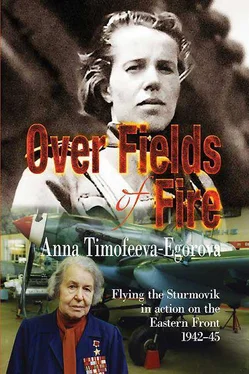Questions poured as from a horn of plenty, and I kept answering hanging my head lower and lower, ready to burst into tears. There was less and less hope left that I would fight on a Sturmovik . I even thought Toupanov was distracting me from the main topic intentionally and was sure to conclude at the end of the interview that I wasn’t suitable: women, he would say, do not fly Sturmoviks … But something quite unexpected happened. The head of the Aviation Division Political Section smiled at me as if apologizing, and asked: “Have I tired you out with my questions?” And then concluded: “We are taking you on. Consider yourself a pilot of the 805th Ground Attack Aviation Regiment of our 230th Division. In three days we’re heading off to Derbent. Be ready.”
How happy I was! I rushed outside and began to do cartwheels on my stretched arms, to the friendly laughter of my comrades: it was lucky I was in trousers!
Before departure I went to bid farewell to the commander of the training regiment. He sincerely congratulated me on my transfer to the Sturmoviks but, as if by the way, suggested: “After all, we’ve received ‘Ils’ too. You’d get your own room — you’d be more comfortable. On top of that there’s no flak here. Stay with us.”
“No!”
20. “Not a woman, a combat pilot”
The group of pilots headed off to Derbent by train before dark. I was amongst them — the first female pilot who had got admission to the Sturmoviks … Since my childhood I’d been lucky enough to meet good people. Wherever I studied, wherever I worked I would meet loyal friends, kind-hearted tutors. I was trained at the factory school by the old craftsman Goubanov, I was assisted by the engineer Aliev, who was the shift boss, in my transfer to the most important sector of operations — the tunnel. I was trained by the superb instructor Miroevskiy in the aeroclub, the secretary of the Ulyanovsk District Comsomol Committee gave me a hand at a very hard moment of my life, then there was Maria Borek from Leningrad, the Secretary of the Smolensk District Comsomol Committee, the Commissar of the Smolensk aeroclub… Was it really possible to count all those who had warmed my soul with their sympathy and human kindness and helped me to realize my dream!
But not everyone met me with sympathy in the ground attack regiment. There were some (for some reason, especially many of those belonged to the technical staff) who grumbled under their breath “What good is a woman in ground-attack aviation?” But the regiment navigator Petr Karev shushed them: “The Regiment’s not getting a woman, it’s getting a combat pilot…”
So there I was in the ground attack regiment. The Battalion Commissar Ignashov — deputy commander for political affairs — summoned us, the newly arrived pilots, by turns for interview. I didn’t know what he had spoken about with my comrades, but I was stunned by his very first question: “And what’s the point of putting yourself in mortal danger?”
“Mortal all of a sudden?” I growled, displeased.
But Ignashov went on: “A Sturmovik is too hard for a woman. And take into account, our losses are rather great. I’ll tell you confidentially that in the latest fighting over Gizel village we lost nearly all our airmen. Although our plane is armour-plated, more airmen die in it than in any other kind of plane. Think it over properly and go back to the training regiment. The Sturmovik isn’t suitable for a woman!”
“And what is suitable for a woman at war, Comrade Commissar?” I asked challengingly. “To be a medic? To drag a wounded man from the battlefield under enemy fire, strained beyond her strength? Or being a sniper? To stalk the enemy under cover for hours in all weathers, kill them, get killed herself? Or maybe, a surgeon would be easier? To receive the wounded, to operate under bombing and, seeing people suffer and die, suffer herself?”
Ignashov wanted to say something but I was already hard to stop. “Obviously it would be easier to be dropped off behind enemy lines with a radio transmitter? And maybe now women are better off on the home front? They smelt metal, grow corn and bring up kids at the same time, they get the death notices of their husbands, fathers, brothers, sons, daughters? It seems to me, Comrade Commissar”, by now I had began to talk quieter, “now is no time to see any difference between a man and a woman until we cleanse our motherland of the Hitlerites…”
I finished my impromptu ‘performance’, and then Ignashov smiled: “That’s right, my daughter is as cranky as you. She used to work in a base hospital as a surgeon, but no way: she had to be at the frontline. Currently she’s somewhere near Stalingrad… We haven’t heard from her for a long while — neither my wife nor me. My wife suffers especially — she’s alone at home… Do you write letters to your family?” Ignashov asked, taking some pills out of his pocket. Only now did I discern how ill he was. He had ‘bags’ under his eyes, blue lips, and a pale and puffy face.
“I do write letters but haven’t had any from home for a long time. I feel very sad sometimes. Then I convince myself that it’s the field mail’s fault…”
“At your age you can convince yourself even of something pleasant”, the Commissar said, addressing me with ‘thou’ for the first time. “Are you married?”
“No”, I replied in one word, and suddenly, as if I had at long last found someone to speak my mind to, to disclose my innermost thoughts to, I burst out: “But I love very much one man, a pilot. He’s a fighter pilot, in combat somewhere near Leningrad. We wanted to get married before the war but I kept postponing it. One time I said that we should graduate from the flying school, another time that I had to turn out one more group of cadets, and then the war came…”
The conversation with Ignashov clearly took too long but we parted like old friends.
“You can come to me with all your questions, joys and sorrows. We will sort everything out together”, he said, sort of casually, in farewell, and stretched his hand out to me. Ignashov was popular in the regiment. As for the political commissar who had been his predecessor in the 805th, once they had even bashed him! According to the stories he used to just walk around giving orders. The regiment was in combat, men were dying, everyone was having a hard time, but he would just give orders… Ignashov was a completely different man.
We were given only two days to study the Sturmovik equipment and get ready for examination by the senior regimental engineer. All the newly-arrived men were distributed among the squadrons straightaway. The pilot Vakhramov and I were sent to the 3rd Squadron. Puny, short Valya 98 98 Translator’s note — diminutive of Valentin.
Vakhtramov looked like a boy. And when we’d found out that he was only about nineteen we were surprised: this little chap, with this height, had managed to put up his age so as to join an aviation school!
When we reached the Ogni aerodrome Vakhramov lagged behind the train. There were very few passenger trains back then and he had to catch up with us on a tanker of fuel oil. Of course he was stained badly and had also lost his papers. In short, when Valentin arrived at the regiment nobody would believe he was a pilot: my confirmation was required. The regiment commander himself met Vakhramov out and said just one thing: “Clean yourself up!”
The regimental chief-of-staff Captain Belov told us the regiment’s war stories, told about the airmen who had distinguished themselves in combat. We found out that our 805th Ground-attack Regiment had been raised from the 138th High-speed Bombers. It had been in combat since the first day of the war. The airmen flew bombing missions against the columns of German troops advancing from the Western frontier towards Kiev and losses in the regiment were very heavy. When almost no fighting machines were left in it, the regiment moved by railroad to Makhachkala 99 99 Translator’s note — a city on the west shore of the Caspian Sea.
and then across the sea to Astrakhan 100 100 Translator’s note — a city on the north shore of Caspian in the mouth of the Volga.
where the pilots were going to learn to handle the new Pe-2 plane — a dive-bomber of Petlyakov’s design. I disliked it — but I didn’t fly it, just watched it.
Читать дальше












